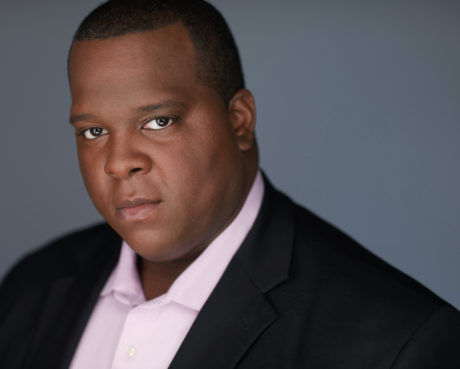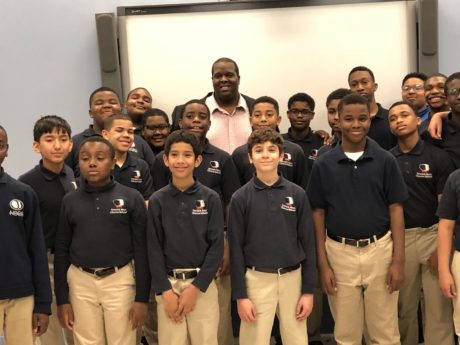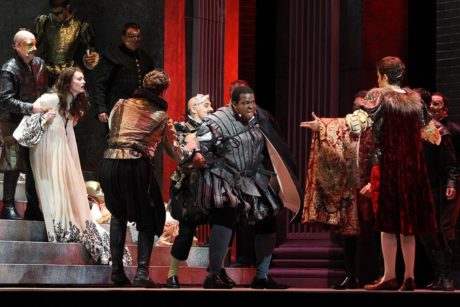Baritone Joshua Conyers is becoming a mainstay in the Washington area. Conyers is a Summer 2018 Filene Artist at Wolf Trap Opera, where he has sung Count Capulet in Charles Gounod’s Roméo et Juliette, shared the stage with George Takei, Misty Copeland, and other luminaries in Wolf Trap’s tribute to Leonard Bernstein, and will take on the role of Count Monterone in the Wolf Trap Opera premiere of Giuseppe Verdi’s Rigoletto on August 3 with the National Symphony Orchestra. Conyers will be sticking around D.C. for the foreseeable future, as a member of Washington National Opera’s Domingo-Cafritz Young Artist Program for the 2018/19 season.

Conyers is still early in his career, but already has developed mature, insightful opinions on how young singers can best prepare for a career in opera; the importance of gender parity in opera leadership; and his plans for when his performing career is over. Perhaps this maturity comes from Conyers’ difficult childhood and musical mentors who steered him toward a better path early on. Conyers recognizes the importance of good mentorship and is making that a priority in his busy career.
- This summer you’ve performed in Wolf Trap Opera’s Roméo et Juliette, Bernstein at 100 concert, and Rigoletto, all very different productions. What did you find uniquely enjoyable and/or challenging about each?
This summer has been a whirlwind for me and I had the pleasure of performing many genres of music. What is so uniquely enjoyable about performing different genres of music at the same time is that I get to explore different aspects of my vocal production, from using my vocalism to sing beautiful legato lines in Roméo et Juliette, expressing the music through text at the forefront in Bernstein, to singing declamatory and powerfully in Rigoletto. What has been particularly challenging is learning how to vocally pace myself in the midst of a great amount of music and performances. But this has been a significant learning experience about vocal stamina and how to truly take care of my instrument for hopefully a long career.
- What has been the most surprising thing you’ve learned through your participating in WTO’s Filene Artist program?
The most surprising thing about being a Filene Artist is the respect and appreciation from the staff and administration of the work that we do as performers, and I do not say this lightly. As young artists, we are often given a vast amount of responsibility, which can consist of outreach performances in schools/communities, performing supporting roles and covering leading roles. Occasionally we feel undervalued, unappreciated and overworked. At Wolf Trap, they work us very hard but they do a tremendous job of making us understand that the work we are doing this summer is appreciated. They care deeply about our well-being, not only as musicians, but as human beings.
Also, something I find surprising but yet necessary and significant is the female leadership at WTO. The opera world is this beautiful mixed bowl of races, cultures, and genders but unfortunately, it is not well represented on stage and in administration. WTO should be a model to the opera world of inclusivity and female empowerment.
- You recently joined the Young Professionals Advisory Board of the Newark Boys Chorus School in New Jersey. What does that entail? What role does advocacy and outreach play in your career?
Getting involved with the Newark Boys Chorus School was fate, and I must tell you how this all started. As a musician, money can be hard to come by, so we pick up odd jobs to pay the bills. I knew I would not be any good as a waiter so I became (and still am) an Uber/Lyft driver. A young African American woman gets into my car and, since the performer in me always has to engage in conversation with every passenger, I mention that I am an opera singer. She tells me about NBCS and that they were looking for a musician to be a part of the Young Professionals Advisory Board in the role of a mentor. At first, I thought to myself, “Do I really have what it takes to mentor at-risk young boys?” I doubted that I could truly make a difference. But my lovely wife Laura reminded me of all the mentors that I had as an at-risk young man and told me that I was selling myself short.

I grew up with parents who abused drugs and alcohol. We were constantly in and out of the shelter system because my parents couldn’t hold down jobs. I lived without running water for a month and we would have to go to vacated homes, hoping the water was still on so we could fill up water jugs to wash up and have water to drink. I was angry and I was headed down the wrong path. Music and my music teachers saved my life. I went from a D student to an A student, I stopped skipping school and my immature behavior began to waver because I had mentors who were willing to see the potential in me and help me become a better person. I have a responsibility to help the next generation of kids in any way possible. I am honored I get to help these kids rise above their situation and strive to be the best that they can be.
- You have performed in several American and world premiere operas. What is the process of preparing for a new opera, and how is it similar or different from preparing for an opera like Rigoletto?
I will have to get up on my soapbox and tell every young vocal musician to pay attention in theory, aural theory, and sight-singing while in school! As vocalists, we gripe and protest in school about taking all of these classes when all we want to do is sing, learn great vocal technique, and perform on the stage. These are all great goals to have, but having the ability to dissect and break down a score of music is vital to having a successful career in this business.
When learning an opera of any kind, I always take the same three steps. First, I research the story and the characters. If the opera was originally based on a book, I will read that book to see how the author saw the characters, compared to how the librettist and composer saw the characters. Second, I translate every foreign language opera into English. As a singing actor, it is essential to know exactly what you are saying and what the other characters are saying. Third, I speak through the text in rhythm. Most of the time, before a note is written, the librettist hands the composer the text, so I try to understand how the text influences the music. I do all of this before I open my mouth to sing a single note.

When learning a masterpiece like Rigoletto, I always have to keep in mind that Giuseppe Verdi composed this opera in the confines of a particular style of his time, which makes the music to the trained ear easy to learn but difficult to master and sing. In modern opera, most of the conventions of classical, bel canto, and verismo music have vanished. When learning a modern opera without any traditional conventions, I must create my own patterns and figure out how each vocal note that is written fits in with each chord progression. So…my advice is to pay attention in school!
- Is there a particular question or topic you wish interviewers would ask you about?
I often wish that I would get asked more about my plans for when my performing career comes to an end. More often than not, musicians sacrifice so much of their personal lives to pursue their dreams as an opera star or instrumentalist, that we don’t ever take the time or make plans for what is next. Most of us are not fortunate enough to do this forever. For me, music is just one of the loves of my life, and I have so much else to live for. To answer my own question, I would want to be a voice teacher or start my own school. I want to give back to the community as much as I can and I believe education is the way of inspiring the next generation to greater heights.
Joshua Conyers performs in Rigoletto, presented by Wolf Trap Opera and the National Symphony Orchestra, on August 3, 2018, at the Filene Center at Wolf Trap National Center for the Performing Arts, 1551 Trap Road, Vienna, VA. To purchase tickets, go online.




